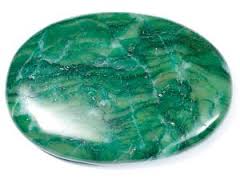jade
英 [dʒeɪd]
美 [dʒeɪd]
- n. 翡翠;[宝] 碧玉;老马
- adj. 玉制的;绿玉色的
- vi. 疲倦
- vt. 使疲倦
- n. (Jade)人名;(英)杰德;(法)雅德
使用频率:

记忆方法
将“jade”与“green gem”联想,想象一块绿色的宝石,它的名字和它本身的颜色相符,有助于记忆这个词是指翡翠这种绿色宝石。
以上内容由AI生成, 仅供参考和借鉴
中文词源
jade 玉,翡翠
来自法语le jade,来自西班牙语piedra de la ijada,冶疗肾病的玉石,来自piedra,石头,词源同petrify,ijada,回肠,肾部。据说这种石头可以治疗和缓解肾部疾病而得名。
jade 老马词源不详。
英语词源
- jade
-
jade: English has two words jade, of which by far the commoner nowadays is the name of the green stone [18]. Despite the mineral’s close association with China and Japan, the term has no Oriental connections. It is of Latin origin, and started life in fact as a description of the stone’s medical applications. Latin īlia denoted the ‘sides of the lower torso’, the ‘flanks’, the part of the body where the kidneys are situated (English gets iliac [16] from it).
In Vulgar Latin this became *iliata, which passed into Spanish as ijada. Now it was thought in former times that jade could cure pain in the renal area, so the Spanish called it piedra de ijada, literally ‘stone of the flanks’. In due course this was reduced to simply ijada, which passed into English via French. (Jade’s alternative name, nephrite [18], is based on the same idea; it comes from Greek nephrós ‘kidney’.) English’s other word jade [14] now survives really only in its derivative adjective jaded ‘tired, sated’ [16].
It originally meant ‘worn-out horse’, and was later transferred metaphorically to ‘disreputable woman’. Its origins are not known.
=> iliac; jaded - jade (n.1)
- ornamental stone, 1721, earlier iada (1590s), from French le jade, error for earlier l'ejade, from Spanish piedra de (la) ijada (1560s), "stone of colic, pain in the side" (jade was thought to cure this), from Vulgar Latin *iliata, from Latin ilia (plural) "flanks, kidney area" (see ileum).
- jade (n.2)
- "worn-out horse," late 14c., "cart horse," of uncertain origin. Barnhart suggests a variant of yaid, yald "whore," literally "mare," from a Scandinavian source akin to Old Norse jalda "mare," from Finno-Ugric (compare Mordvin al'd'a "mare"). But OED finds the assumption of a Scandinavian connection "without reason." As a term of abuse for a woman, it dates from 1550s.
- jade (v.)
- "to weary, tire out, make dull," c. 1600, from jade (n.2). Related: Jaded; jading.
权威例句
- 1. Jade nestled her first child in her arms.
- 杰德怀里抱着她的第一个孩子。
- 2. a collection of Chinese jade
- 一批中国玉器
- 3. He presented us with a couple of jade lions.
- 他送给我们一对玉狮子.
- 4. Jade is a precious stone.
- 玉是宝石.
- 5. Other jade carvings pale beside this.
- 其他玉雕跟这件相比大为逊色.